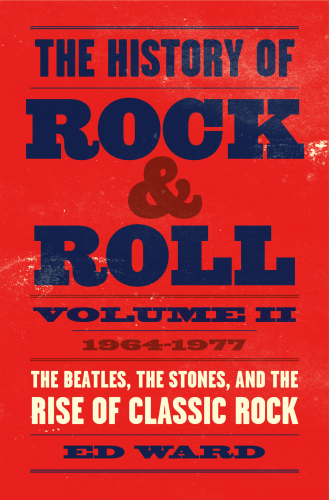
The History of Rock & Roll, Volume 2
1964–1977: The Beatles, the Stones, and the Rise of Classic Rock
کتاب های مرتبط
- اطلاعات
- نقد و بررسی
- دیدگاه کاربران
نقد و بررسی

September 23, 2019
Following up The History of Rock & Roll: 1920 to 1963, Ward smartly and succinctly surveys just over a decade of rock’s rapid evolution. He covers the gamut of musical styles, including the British Invasion, surf sound, guitar rock, R&B, soul, blues, reggae, country, and even some jazz. Not surprisingly, he begins with the Beatles and posits the decades-old question, “Beatles or Stones,” explaining the bands’ different backgrounds (Beatles, working-class Liverpool; Stones, middle-class London) and how each had its own devoted fan base. Ward includes some great tidbits, such as how the small labels that released some of the Beatles’ early U.S. records filed injunctions against Capitol Records in 1964; how Jan Berry of Jan & Dean nearly died in a car accident at the spot he wrote about years earlier in their song “Dead Man’s Curve”; and how the unintelligible lyrics of “Louie, Louie” came to be investigated by the FBI. Ward ends the decade with The Last Waltz, Martin Scorcese’s documentary of The Band’s 1976 concert, whose guests (Bob Dylan, Joni Mitchell, Ringo Starr, Ronnie Wood, and Neil Young) “had been enshrined by Rolling Stone... as rock royalty.” Ward’s deep dive into this influential era will send even the most knowledgable rock aficionados back to their vinyl collections.

October 7, 2019
The second of a proposed three-volume series, this ambitious whirl through the advent of modern popular music opens with the Beatles' first U.S. tour and closes with the death of Elvis Presley, two major events that bookend rock's evolution from a teenage dance craze to a billions-grossing business that swallowed up the rest of the music industry. Simply stitching all this material together is an impressive feat, and the breadth, if not depth, of coverage here from rock historian Ward (cohost, Let It Roll podcast; The History of Rock & Roll. Vol. 1: 1920-1963) is commendable. "Rock & Roll" actually takes in rock, pop, and soul on both sides of the Atlantic, and, to a lesser extent, blues, folk, country, and jazz. The storytelling is strongest when describing how one musical trend or genre could influence another. But the juggernaut of who, when, and how hurtles onward, with the observer barely able to take a breath before Ward name-checks another avalanche of artists and records, rarely focusing on any long enough for a more detailed examination. While this work is well researched, there is just too much ground to cover. Despite some clever and astute commentary, a series this all-encompassing needs a fuller treatment to reach a wider audience.
VERDICT Mainly of interest to music historians, vintage record collectors, and informed general readers.--Clayton Boyer, NoveList, EBSCO Information Syst., Durham, NC
Copyright 2019 Library Journal, LLC Used with permission.

November 15, 2019
A sprawling yet strangely compact history of the years of rock's golden age. Austin-based music journalist Ward, co-host of the Let It Roll podcast, sets a daunting task: to say something new about the likes of the Beatles and the Rolling Stones, each of which fills libraries of criticism and biography. He answers by going deep here and there while painting a big picture view of the effect those groups had on the world, especially the United States. The Beatles appeared on the Ed Sullivan Show in February 1964. By 1965, writes the author, "guitar bands were erupting everywhere," a pack headed by the Byrds but made up of groups as various as the Lovin' Spoonful, the McCoys, the Bobby Fuller Four, and the bizarre Nightcrawlers, of "Little Black Egg" fame. The Brits captured the most attention during that time, but things were happening on plenty of peripheries: Memphis, for instance, where Otis Redding was working hard to develop an audience and write a hit, and American towns everywhere, where one-hit wonders were doing their thing. "Who were Pidgeon? Rhinoceros? Kak? The Serpent Power? The Wildflower? Zakary Thaks? The Harbinger Complex? Crow?" Ward asks, answering, no one and everyone, sometimes capable of producing songs and artists that would go on to make history, such as guitar wizard David Lindley and Captain Beefheart. Of course, the Stones and the Beatles figure prominently in the narrative, but so do whirlwinds of bands who sometimes turn up a dozen to the page in Ward's overstuffed narrative. As for the age-old question, Beatles or Stones? Ward delivers a nicely oblique answer: It depends on whether you like live or studio music. By the end of the book, which is full of interesting surprises--e.g., it was Frank Sinatra's label that took a chance on Jimi Hendrix--readers will have encountered scores of bands they've never heard of and plenty of grist for the playlist. Essential for deep-dyed rock fans, collectors, and fans of literate music writing.
COPYRIGHT(2019) Kirkus Reviews, ALL RIGHTS RESERVED.

























دیدگاه کاربران